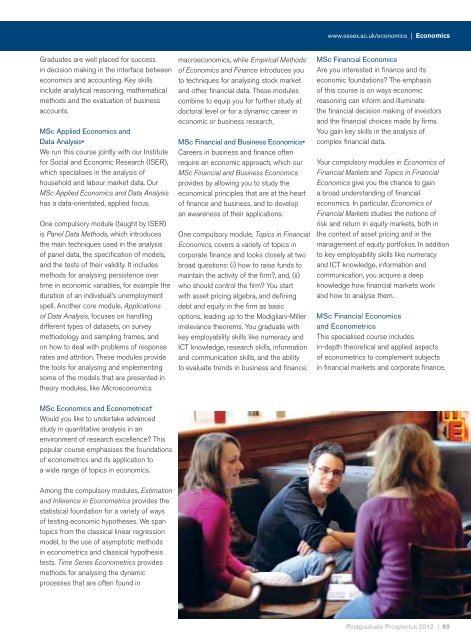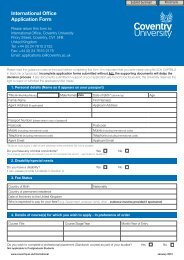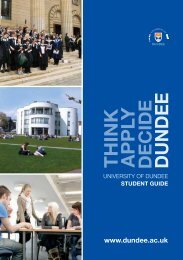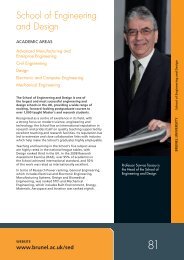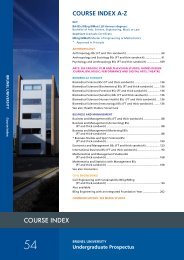Postgraduate Prospectus
Postgraduate Prospectus
Postgraduate Prospectus
Create successful ePaper yourself
Turn your PDF publications into a flip-book with our unique Google optimized e-Paper software.
www.essex.ac.uk/economics | Economics<br />
Graduates are well placed for success<br />
in decision making in the interface between<br />
economics and accounting. Key skills<br />
include analytical reasoning, mathematical<br />
methods and the evaluation of business<br />
accounts.<br />
MSc Applied Economics and<br />
Data Analysis•<br />
We run this course jointly with our Institute<br />
for Social and Economic Research (ISER),<br />
which specialises in the analysis of<br />
household and labour market data. Our<br />
MSc Applied Economics and Data Analysis<br />
has a data-orientated, applied focus.<br />
One compulsory module (taught by ISER)<br />
is Panel Data Methods, which introduces<br />
the main techniques used in the analysis<br />
of panel data, the specification of models,<br />
and the tests of their validity. It includes<br />
methods for analysing persistence over<br />
time in economic variables, for example the<br />
duration of an individual’s unemployment<br />
spell. Another core module, Applications<br />
of Data Analysis, focuses on handling<br />
different types of datasets, on survey<br />
methodology and sampling frames, and<br />
on how to deal with problems of response<br />
rates and attrition. These modules provide<br />
the tools for analysing and implementing<br />
some of the models that are presented in<br />
theory modules, like Microeconomics.<br />
macroeconomics, while Empirical Methods<br />
of Economics and Finance introduces you<br />
to techniques for analysing stock market<br />
and other financial data. These modules<br />
combine to equip you for further study at<br />
doctoral level or for a dynamic career in<br />
economic or business research.<br />
MSc Financial and Business Economics•<br />
Careers in business and finance often<br />
require an economic approach, which our<br />
MSc Financial and Business Economics<br />
provides by allowing you to study the<br />
economical principles that are at the heart<br />
of finance and business, and to develop<br />
an awareness of their applications.<br />
One compulsory module, Topics in Financial<br />
Economics, covers a variety of topics in<br />
corporate finance and looks closely at two<br />
broad questions: (i) how to raise funds to<br />
maintain the activity of the firm?, and, (ii)<br />
who should control the firm? You start<br />
with asset pricing algebra, and defining<br />
debt and equity in the firm as basic<br />
options, leading up to the Modigliani-Miller<br />
irrelevance theorems. You graduate with<br />
key employability skills like numeracy and<br />
ICT knowledge, research skills, information<br />
and communication skills, and the ability<br />
to evaluate trends in business and finance.<br />
MSc Financial Economics<br />
Are you interested in finance and its<br />
economic foundations? The emphasis<br />
of this course is on ways economic<br />
reasoning can inform and illuminate<br />
the financial decision making of investors<br />
and the financial choices made by firms.<br />
You gain key skills in the analysis of<br />
complex financial data.<br />
Your compulsory modules in Economics of<br />
Financial Markets and Topics in Financial<br />
Economics give you the chance to gain<br />
a broad understanding of financial<br />
economics. In particular, Economics of<br />
Financial Markets studies the notions of<br />
risk and return in equity markets, both in<br />
the context of asset pricing and in the<br />
management of equity portfolios. In addition<br />
to key employability skills like numeracy<br />
and ICT knowledge, information and<br />
communication, you acquire a deep<br />
knowledge how financial markets work<br />
and how to analyse them.<br />
MSc Financial Economics<br />
and Econometrics<br />
This specialised course includes<br />
in-depth theoretical and applied aspects<br />
of econometrics to complement subjects<br />
in financial markets and corporate finance.<br />
MSc Economics and Econometrics†<br />
Would you like to undertake advanced<br />
study in quantitative analysis in an<br />
environment of research excellence? This<br />
popular course emphasises the foundations<br />
of econometrics and its application to<br />
a wide range of topics in economics.<br />
Among the compulsory modules, Estimation<br />
and Inference in Econometrics provides the<br />
statistical foundation for a variety of ways<br />
of testing economic hypotheses. We span<br />
topics from the classical linear regression<br />
model, to the use of asymptotic methods<br />
in econometrics and classical hypothesis<br />
tests. Time Series Econometrics provides<br />
methods for analysing the dynamic<br />
processes that are often found in<br />
<strong>Postgraduate</strong> <strong>Prospectus</strong> 2012 | 89


